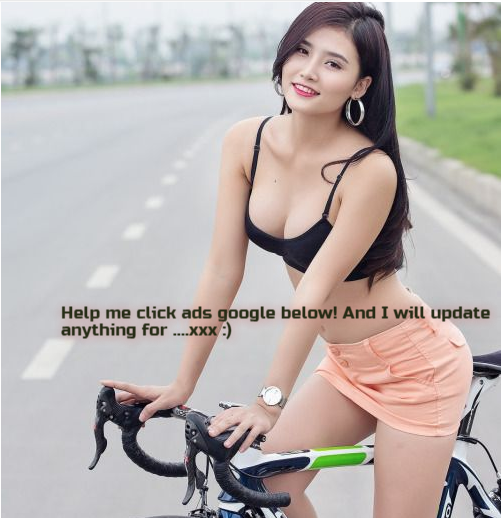
You're scrolling through your favorite news site when you see an article that catches your eye. You click on the link and start reading, only to realize that it's an ad. But it's not just any old ad – it's a native ad. Native advertising – facilitated by native ad platforms – represents a new way of thinking about online ads.
Rather than relying on disruptive banner ads and intrusive pop-ups, native advertising uses content that fits in with the surrounding editorial content.
As a result, native advertising can capture attention more effectively and drive conversions (more on this later).
This post will discuss the top native ad platforms and what criteria to look for when choosing one. We'll also dive into current trends in the native advertising landscape and critical principles to know before you set your ads live.
Let's get started!
Best Native Ad Platforms
1. Outbrain
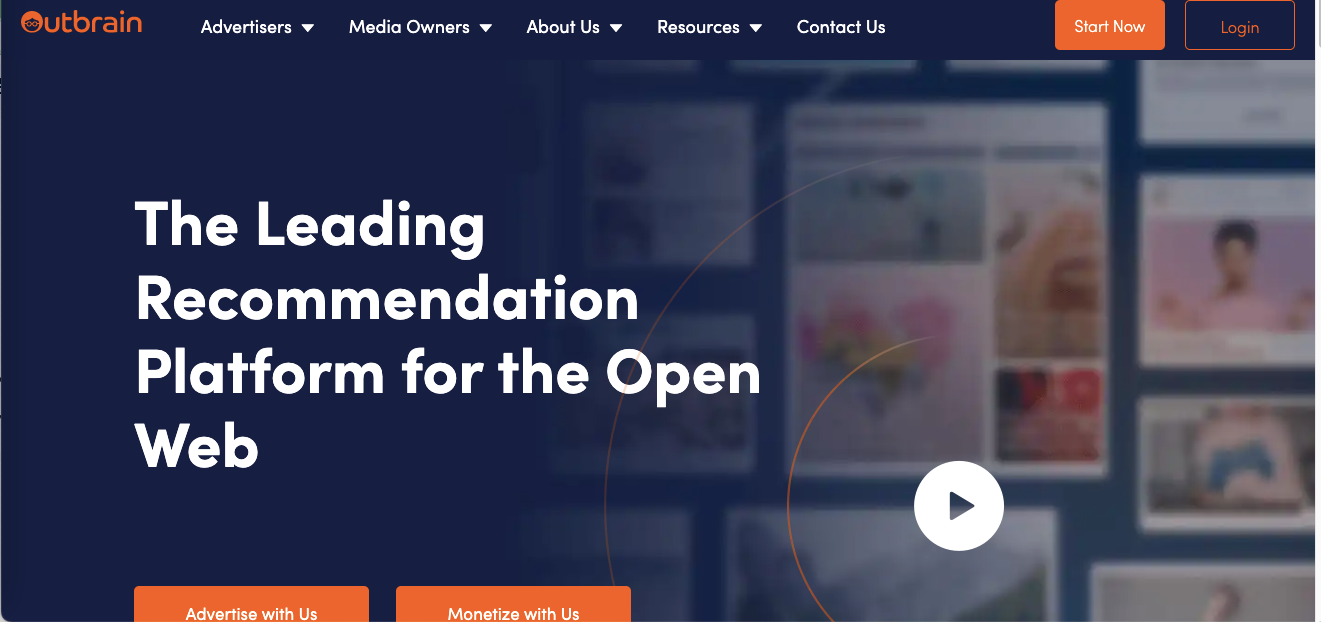
Outbrain is a content discovery platform that helps people find exciting stories around the web. Outbrain delivers 290 million native stories to 1.8 billion pageviews monthly, reaching 1.3 billion people worldwide. The Outbrain network includes over 50% of traffic from Tier 1 countries, including the United States, United Kingdom, Canada, and Australia. The Outbrain publisher network consists of high-quality websites like Sky News, CNN, BBC, and Men's Health.
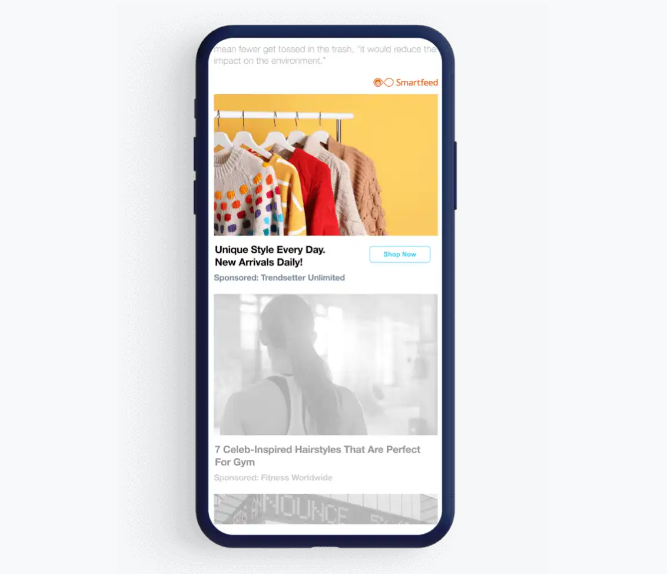
Outbrain has many features that set it apart from other ad platforms. Here are just a few:
- Outreach: You can work with many leading publishers in niche markets.
- Diverse Targeting Options: Target specific audiences using lookalike audiences, geo-targeting, device type, operating system, browser, and interests. Read more about Outbrain's targeting options.
- Strict Quality Policy: Outbrain has a strict quality policy for ads and publishers to ensure the best user experience.
- Bidding: Pay-per-click or cost-per-impression basis, depending on your needs.
- Tracking: Outbrain's custom recommendations can help you fine-tune your ad layout for maximum effectiveness.
And as a result, Outbrain's native advertising platform delivers real ROI for advertisers and publishers.

- Ferrero Rocher saw an average time spent increase of 28% compared to social
- Microsoft saw its leads increase by 180%
- Brooklinen CPC decreased by 200%
- Tacotax also saw significant cost savings with a 42% CPC reduction
- Reach plc saw increased RPM's across all of their sites with Outbrain's Smartfeed
2. Taboola
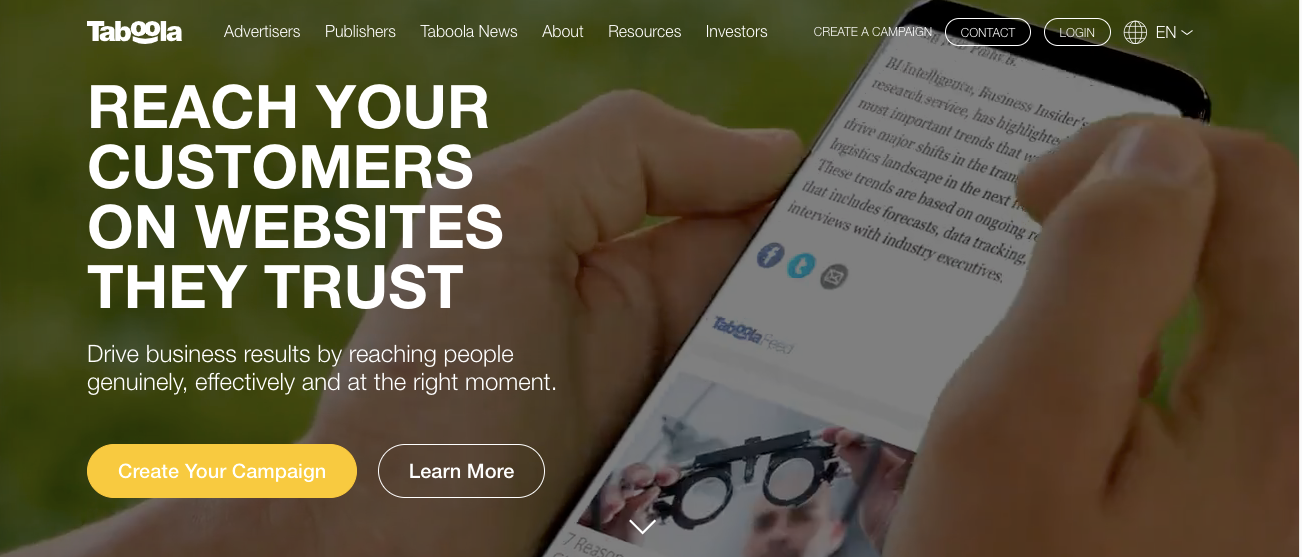
Taboola is one of the largest and most native ad networks in the online advertising world. In addition to their massive reach (1.4 billion unique users per month), they work with high-quality publishers, including MSN, Business Insider, Bloomberg, and Fox. As an advertiser, you can reach a massive audience with an extensive range of ad formats!
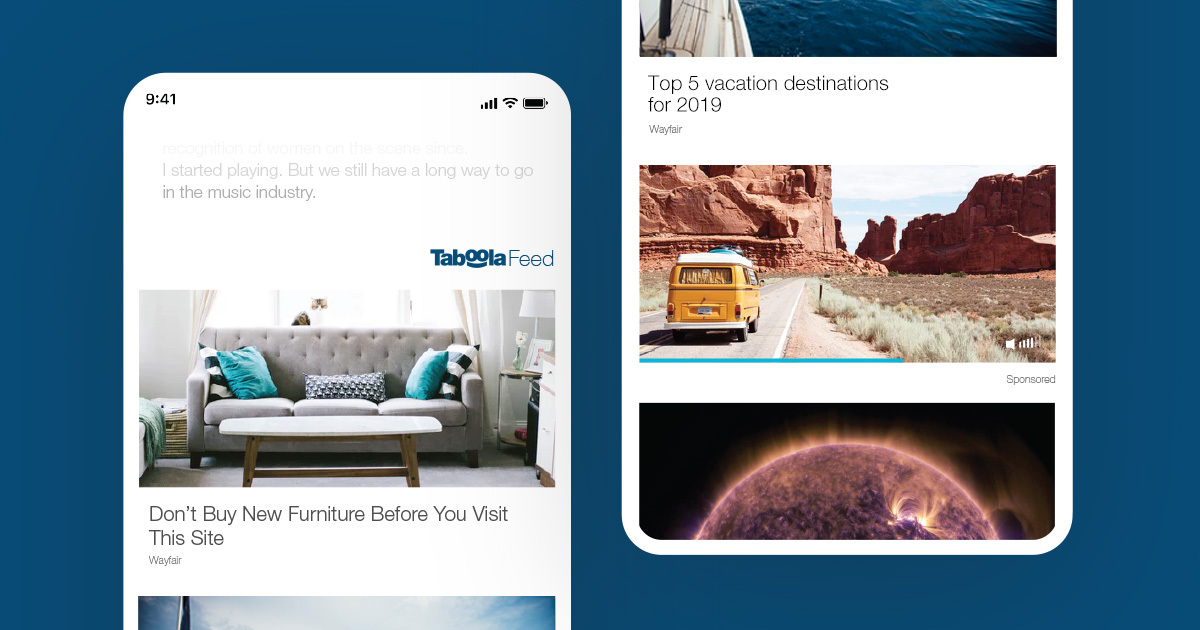
Here are the unique features you should pay attention to:
- Targeting: Platform, location, day of the week, time, placement. They give access to unique targeting options – such as the Attentive Audience feature – advertisers to lower their cost per action (CPA) or increase their conversion rate metrics (CVR).
- Bidding: Fixed bidding (CPC model), Smart bidding (conversion-based learning)
- Ad formats: Native ads, video ads, and sponsored content.
- Tracking: Easy to install conversion tracking code to view campaign performance.
- Taboola Feed: This provides their website visitors with a personalized feed of content, a mix of editorial and sponsored content.
Lifeboost Coffee is one company that significantly benefited from working with Taboola.
Here are their results:
- Converted 10,000 customers outside of social and search in just six months.
- Retargeting CPA was 75% lower than their goal
- Attentive audiences yielded a CPA 87% lower than their goal
3. Yahoo! Gemini
Yahoo! Gemini is a leading native advertising platform that allows advertisers to place sponsored ads on propriety sites like Yahoo.com and premium publishers such as ESPN, ABC News, Apple News, and MSN.
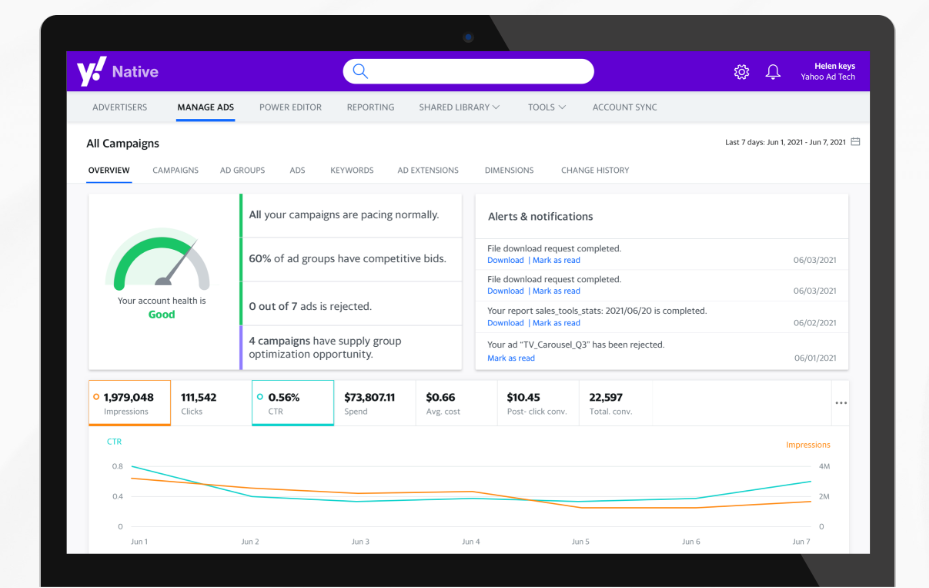
With over 60 billion monthly impressions, Yahoo! Gemini offers a unique opportunity for advertisers to reach a large, engaged audience.
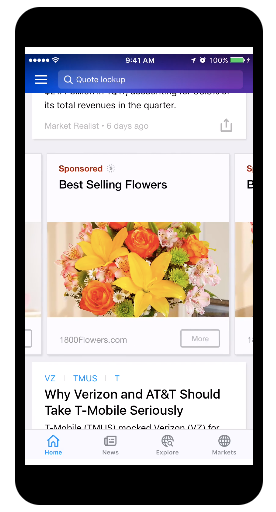
Here's what the native advertising platform has to offer:
- Targeting: Geo, native list, device, audience segment, contextual
- Ad formats: Image ads, search ads, video ads, app Install ads, carousel ads, yahoo mail ads, moments Ads
- Bidding: Both manual and automated bidding options, including Enhanced CPC, Manual CPC (focus on clicks), Target CPA (focus on conversions and cost per acquisition), and maximize conversions (focus on the highest volume of conversions within budget)
- Tracking: Conversion rules, specific-page tracking, event tracking, custom audience segmentation
One key feature is the ability to import Google Ads data, which can save time and effort when setting up campaigns. Gemini also offers an option to import ad data from Excel, making it easy to get started with large-scale campaigns.
4. MGID: Programmatic Advertising Platform
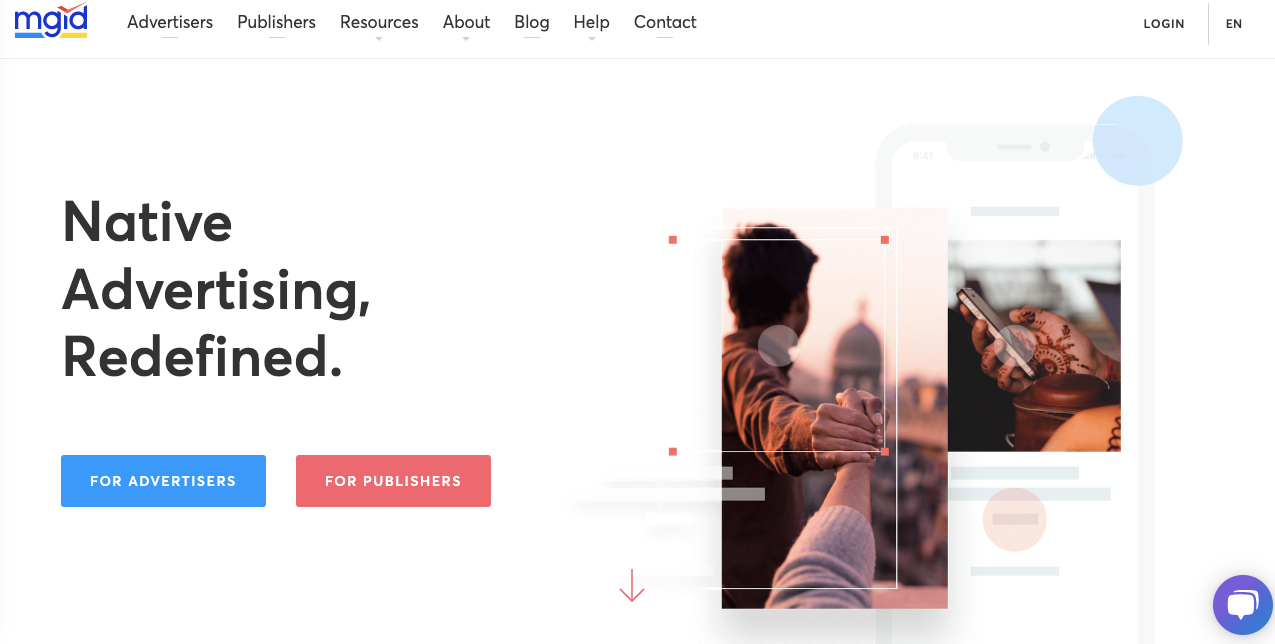
MGID is one of the world's best native advertising platforms, with over 850 million monthly users and 32,000 content websites. MSN.com, Investing.com, and Travel + Leisure are just a few premium publishers in their native ad network.
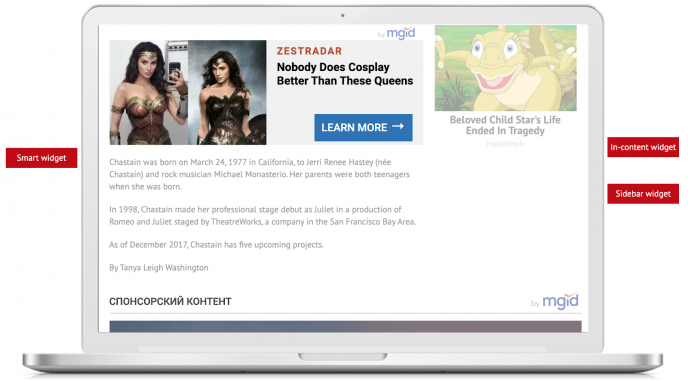
60% of MGID's traffic comes from Europe and the USA, with Asia-Pacific accounting for a significant portion of the rest.
Here are the MGID ad network features:
- Targeting: Geo, Browser, Targeting OS, Language, Mobile Connection, Audiences, Retargeting
- Tracking: Postback tracking (integrates with your affiliate network or tracker), GA integration
- Ad Formats: Image ads, push ads, motion ads (looped images)
- Bidding: Price-based bidding system allows you to adjust impression costs as needed.
MGID affiliates can promote a broader range of offers, including those that may be less compliant such as grey and black hat offers. In addition, MGID requires publishers to have a minimum number of 5000 visitors per month. This makes it an ideal platform for small and medium-sized publishers looking to get started in native advertising.
5. Nativo
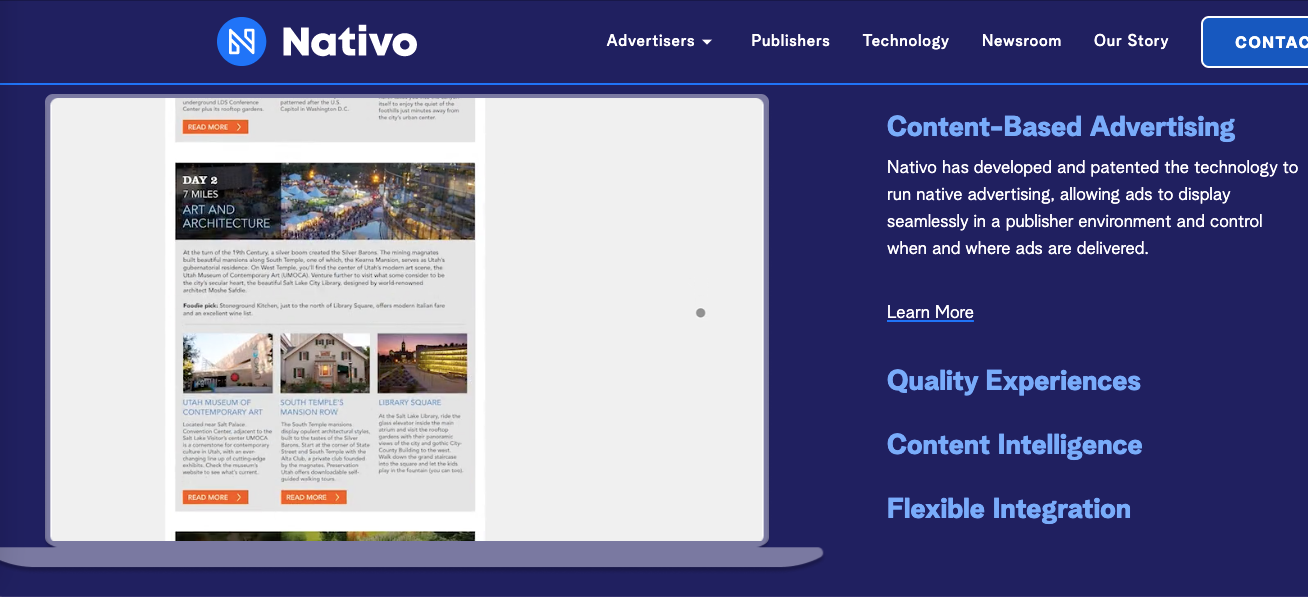
The Nativo ad platform is the leading technology solution for marketers looking to reach their audience through native advertising. Over 600 brands and 400 publishers use Nativo to power their native campaigns, including some of the world's most premium publishers like Entrepreneur, New York Post, Business Insider, Fast Company, and Forbes.
With Nativo, marketers have direct one-on-one relationships with 3,500+ of the world's most premium publishers, ensuring that the right people see their campaigns at the right time. And with privacy restrictions like GDPR and CCPA coming into effect, Nativo is future-proofing your campaigns to ensure they comply with all the latest regulations.
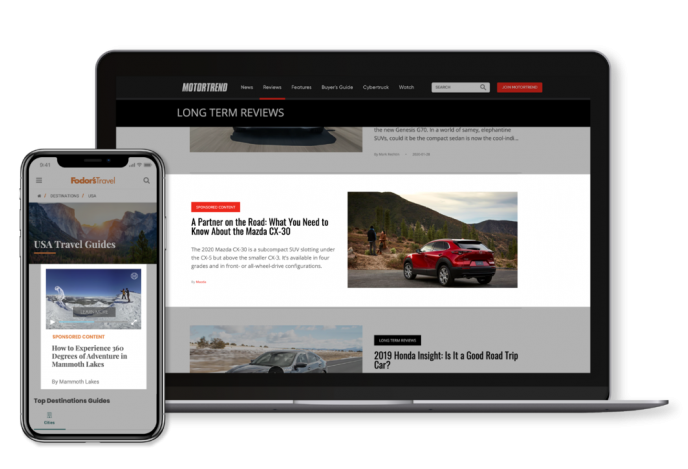
- Targeting: Contextual, Geo, Browser, Targeting OS, Language, Mobile Connection, Audiences, Retargeting
- Tracking: Proprietary content intelligence platform NativoIQ
 . A/B testing.
. A/B testing. - Ad Formats: Native articles, Canvas (full page real estate), Stories format for mobile, Native Video
- Bidding: CPC, CPM, and CPE pricing models. First-price auction bidding.
For publishers, the Nativo ad platform offers technology that ensures ads are served quickly and efficiently. This is especially important for sites that receive a high volume of traffic. In addition, their unique ad formats – particularly stories – result in CTA rates of over 4%.
How To Choose The Right Native Ad Platform for Your Business
With so many native ad platforms, knowing which is right for your business can be challenging. Here are a few things to consider when making your choice:
Premium Audience
A premium audience combines reach and relevance.
It's essential to have lots of eyeballs on your ad. But it's not just about quantity – the quality of the audience matters too. A premium audience contains educated people with high disposable incomes that are influential in their social circles.
They're also more likely to trust credible, high-reputation sources of journalism. So when you advertise to a premium audience, you're not just increasing the number of people who see your ad – you're also improving the quality of those eyeballs.
It's also crucial to deliver ads that are targeted at specific audiences. For example, if you're selling outdoor gear, it makes sense to target your ads at people interested in outdoor activities. If you're selling travel products, it makes sense to target your ads at people interested in travel. And if you're selling health products, it makes sense to target your ads at people interested in health and fitness.
By delivering relevant ads to specific audiences, you can improve the likelihood that they'll take notice of your ad and become paying customers.
Support and Assistance
If you're new to native advertising, you must have access to a team of experienced professionals who can guide you through the process. An excellent creative strategy team will be able to recommend headlines and images that are likely to resonate with your target audience.
They'll also be able to suggest different ways to approach your campaign based on their experience with similar projects.
Access to an account manager is also valuable, as they'll be able to recommend the best optimizations from the start. This includes blacklists, whitelists, device placements, and ad placements. Having someone familiar with the native advertising landscape will save you a lot of time and help you avoid making costly mistakes.
Partner Relationships
Click fraud is always possible when advertising online, but working with a company with direct relationships with publishers can help combat this issue.
With greater visibility into where your ads will appear, you can verify all activity and be sure that your ads are being placed in front of legitimate users.
Testing Budget
Before committing to a native advertising platform, you must factor in your testing budget. First, you need to give yourself enough budget to see results and to test to the fullest extent. If your budget is too small, then you should consider a native ads platform that's less costly or doesn't offer as many placements.
Why is it important to allocate enough budget to testing a campaign thoroughly?
With enough data, you can accurately assess whether the platform is working for you. So before choosing a native advertising platform, ensure you've allocated enough of your budget to testing.
Bidding Model
One of the most important factors to consider is the bidding model. Smart bidding is a crucial element of any successful native ad campaign and can make the difference between a profitable campaign and a losing one.
Native ad platforms that use smart bidding algorithmically adjust your bids based on various factors, including the time of day, the user's location, and the device. This ensures that you're always making the optimal bid for each impression and can help you maximize your return on investment. Conversely, if you're not using an intelligent bidding model, you're likely leaving money on the table.
Tracking
In today's competitive marketplace, businesses need to be able to quickly and efficiently track the performance of their marketing campaigns. This is where quality tracking comes in. By tracking various campaign elements, businesses can isolate winning from losing ones. This helps them to refine their campaigns for maximum profitability.
- Which ads are most effective
- What headline is more powerful
- Devices that convert
- High-performing geographies
- Placements
What Are Native Ad Platforms?
A native ad platform is a service that connects advertisers with publisher sites for native ad placement. These networks – often referred to as content discovery platforms – offer additional benefits such as ad creative support, targeting options, and performance tracking.
How Do Native Ad Platforms Work?
In online advertising, there are two main groups: publishers and advertisers. Publishers are website owners who want to monetize their traffic, and advertisers are companies who want to reach a specific audience with their message.

Native advertising is one way that these two groups can work together. Native ads are placed within the content of a publisher's site, making them more likely to be seen by users than other ads.
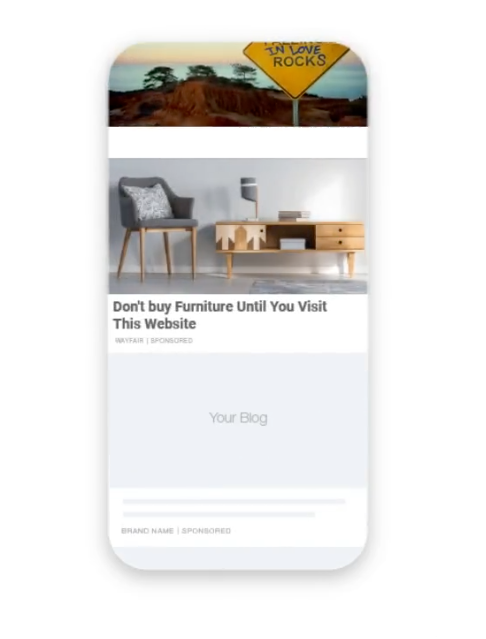
When a user visits a publisher's site, the publisher puts up an ad auction. Advertisers can then bid on the ad space, and the highest bidder gets to show their ad to the user. This system ensures publishers make money from their traffic and advertisers reach high-quality traffic.
Trends in Native Advertising
In recent years, there has been a shift in consumer behavior. More and more people are moving away from passive activities, such as browsing social media, and towards intentional online behavior.
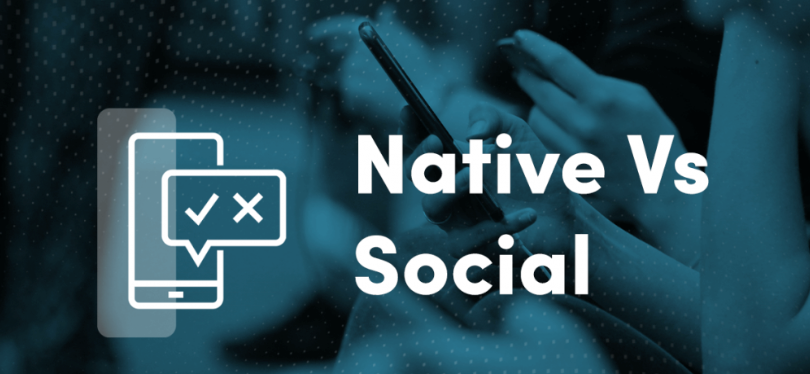
Outbrain and Savana surveyed consumers from Tier 1 countries and found that 21% plan to spend less time on social media within the next six months.
Consumers are turning to editorial sites for information. A recent study found that 75% of respondents trust editorial sites, compared to only 54% who trust social media sites. This trust is especially notable among household decision-makers.
In response to shifting consumer behavior, brands increasingly turn to native ads. As a result, spending on native advertising is expected to reach $98.59 billion next year.
The Benefits of Using a Native Ad Platform
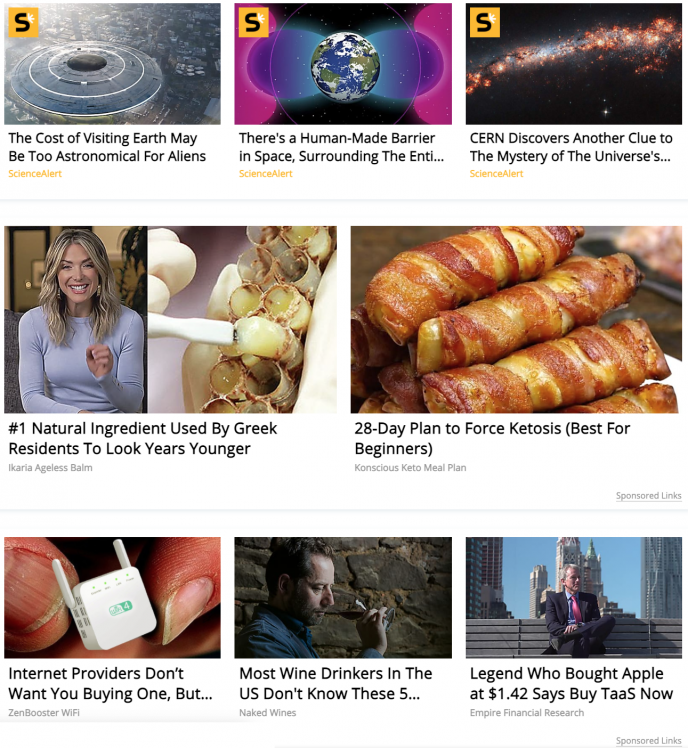
Effectiveness
Simply put, native advertising works. The proof is in the pudding, as they say: a study by Sharethrough and IPG Media Lab found that native ads deliver a viewability rate of 54% compared to display's measly 9%.
Furthermore, 64% of consumers said they had a more positive relationship with brands that delivered them native ads. And even better for brands, 18% more purchase intent was driven by native advertising than by banner ads.
Engagement
Researchers used eye-tracking technology to measure the visual attention and brand lift for native ads from top brands compared to traditional display ads. Their findings suggest that native advertising is an effective way to drive engagement with consumers.
The study found that native ads received higher click-through rates and that consumers looked at native ads 53% more frequently than display ads. Additionally, 25% more consumers look at in-feed native ad placements than display ad units.
Enhanced User Experience
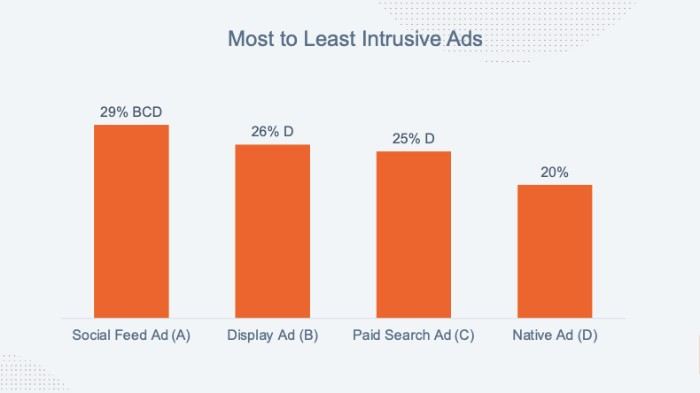
Rather than intruding on the user experience, native ads blend in with the surrounding content. They often take the form of sponsored articles or videos, which can effectively get people to pay attention.
An Outbrain-Savana study showed that consumers view native ads as the least intrusive. If you're looking for a more effective way to reach your target audience, a native ad platform may be just what you need.
Implied Endorsement

Advertisers love implied endorsements because they build trust with potential customers. After all, if a trusted site or influencer is featuring an ad, it must be worth checking out, right?
By associating their products with a reputable source of information, advertisers can increase the perceived credibility of their claims. In many cases, this can lead to a significant increase in sales. For example, imagine that you are considering purchasing a new car.
Which would you be more likely to believe: an advertisement from a “no-name” magazine or an article from a trusted automotive publication?
In all likelihood, you would put more faith in the latter. This is because the publisher has already established itself as a credible source of information, and its endorsement carries weight.
Relevance and Targeting

Relevance and targeting are critical factors in the success of any ad campaign. Users who see an irrelevant ad are less likely to click on it. The advertiser will spend money on impressions that will not lead to conversions.
Contextual targeting is a capability that allows advertisers to target their native advertising impressions to specific audience segments that they know are most likely to generate engagement. This could be based on demographics, interests, browsing behavior, or location.
For example, let's say that a car manufacturer wanted to distribute native ads on a trusted automotive website such as Car and Driver.
Scale and Optimization
In advertising, scale is everything. That's because the whole point of advertising is to reach as many potential customers as possible (as long as it's profitable). Native advertising is an effective way to reach a large audience with your message. As you scale your ads, you need to optimize the following inputs.
- Ad placements
- Sizes
- Creatives
- Geography
The overall optimization philosophy is simple:
1) Cut what isn't working
2) Double down on what is
This way, you can ensure that your marketing budget is being put to good use.
For example, you may want to blacklist ad placements that suck up your budget and don't convert. This can help you “trim the fat” within your campaign that isn't yielding results. Another way to scale native advertising is to whitelist ad placements or increase your bids on placements you know are effective. This can help you maximize your reach and ensure your budget is used for the most successful placements.
Native Ad Platforms Channels
Open Web
Native ads platforms like Outbrain provide readers with content recommendations that appear as native ads on publisher websites. These ads are typically labeled as “recommended for you” or “sponsored content.” In addition, they often match the look and feel of the surrounding site content.
Taboola is another popular native ad platform that partners with publishers to place ads on their sites. These native ads platforms push ads designed to look like standard articles or videos, but they often promote a product or service.
Search
Google was one of the first companies to experiment with native advertising. Native ads on Google search appear as sponsored results, typically marked with a “Sponsored” label.
When a user searches for a relevant term, these sponsored results are displayed alongside organic results based on factors like keyword relevance and advertiser bid. Google also has an audience network – outside of search – where advertisers can show native ads on partner sites.
Social
Social media networks such as Facebook and Twitter allow advertisers to create native ads in the main news feed alongside organic posts from friends and family. One of the most popular native ad formats is the in-feed ad, which appears in the same feed as other content from friends and brands.
Another popular native ad format is the carousel ad, which allows businesses to showcase multiple products or services in a single ad unit. Carousel ads are especially effective on mobile devices, where users are more likely to scroll through their feeds quickly.
Native Ads Platforms: In Conclusion
Are you still wondering if native advertising is suitable for your business? The key to success with native advertising is understanding your goals, targeting the right audience, and optimizing for scale. If you're looking to maximize reach, drive leads or sales, or build brand awareness, then a well-crafted native ad campaign may be just what you need.
Keep in mind the following takeaways:
- Outbrain and Taboola are two of the most popular native ad platforms, offering businesses various targeting and optimization options.
- If you're interested in the lowest-hanging fruit (with the highest ROI), retarget your warm traffic from other sources with native ads.
- To optimize for scale, you'll need to test and refine your targeting and creative elements continually.
I hope this information has helped you to understand the power and potential of native advertising. Whether you're just starting or looking to scale your campaigns, I wish you all the best in your marketing efforts!
For related reading, check out:
- How Much Does Google Adsense Pay Per Pageview?
- 10 Google Adsense Alternatives To Diversify Your Portfolio and Increase Income
The post The Top 5 Native Ad Platforms For Advertisers And Publishers to Profit appeared first on Niche Pursuits.

